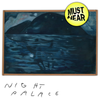The Holy Ambience of Mount Eerie’s ‘Night Palace’
On his latest major work, the songwriter Phil Elverum taps into a mind state beyond deep grief, where familiarity with the unspeakable becomes a strange superpower.

On his latest major work, the songwriter Phil Elverum taps into a mind state beyond deep grief, where familiarity with the unspeakable becomes a strange superpower.
